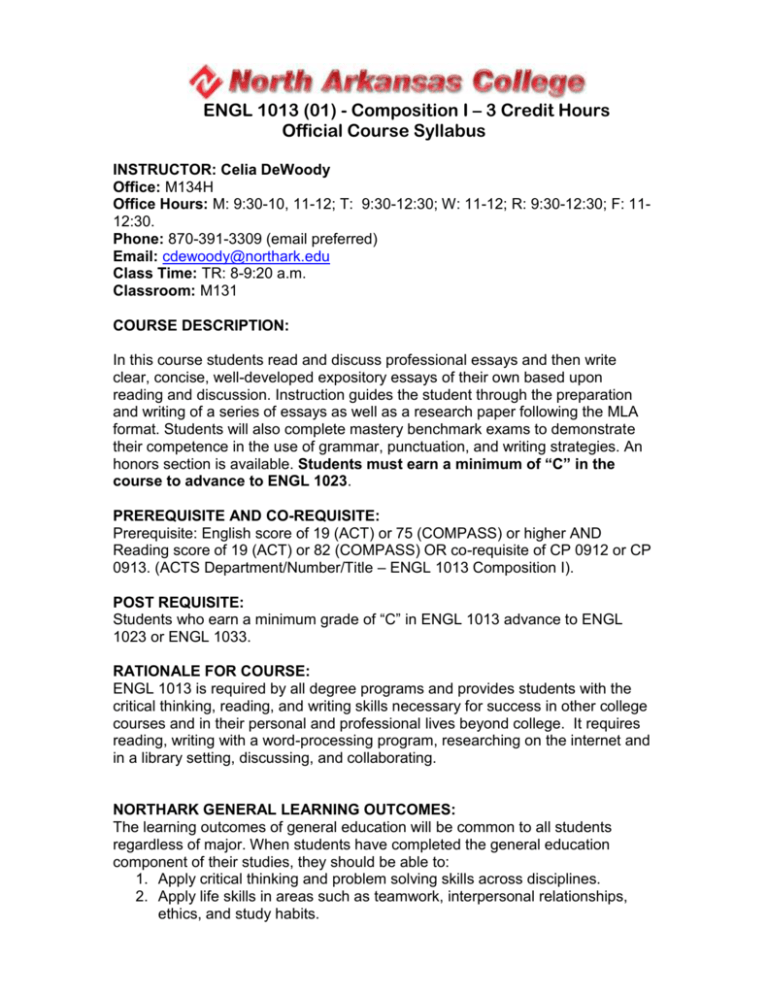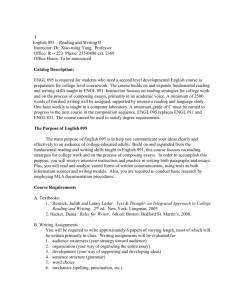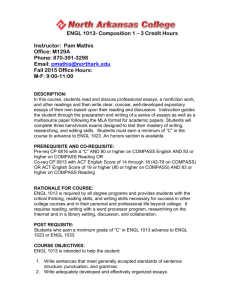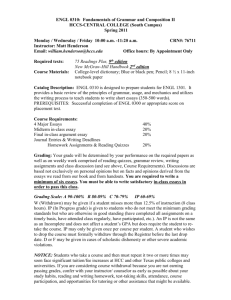English Composition 1013 - Portal
advertisement

ENGL 1013 (01) - Composition I – 3 Credit Hours Official Course Syllabus INSTRUCTOR: Celia DeWoody Office: M134H Office Hours: M: 9:30-10, 11-12; T: 9:30-12:30; W: 11-12; R: 9:30-12:30; F: 1112:30. Phone: 870-391-3309 (email preferred) Email: cdewoody@northark.edu Class Time: TR: 8-9:20 a.m. Classroom: M131 COURSE DESCRIPTION: In this course students read and discuss professional essays and then write clear, concise, well-developed expository essays of their own based upon reading and discussion. Instruction guides the student through the preparation and writing of a series of essays as well as a research paper following the MLA format. Students will also complete mastery benchmark exams to demonstrate their competence in the use of grammar, punctuation, and writing strategies. An honors section is available. Students must earn a minimum of “C” in the course to advance to ENGL 1023. PREREQUISITE AND CO-REQUISITE: Prerequisite: English score of 19 (ACT) or 75 (COMPASS) or higher AND Reading score of 19 (ACT) or 82 (COMPASS) OR co-requisite of CP 0912 or CP 0913. (ACTS Department/Number/Title – ENGL 1013 Composition I). POST REQUISITE: Students who earn a minimum grade of “C” in ENGL 1013 advance to ENGL 1023 or ENGL 1033. RATIONALE FOR COURSE: ENGL 1013 is required by all degree programs and provides students with the critical thinking, reading, and writing skills necessary for success in other college courses and in their personal and professional lives beyond college. It requires reading, writing with a word-processing program, researching on the internet and in a library setting, discussing, and collaborating. NORTHARK GENERAL LEARNING OUTCOMES: The learning outcomes of general education will be common to all students regardless of major. When students have completed the general education component of their studies, they should be able to: 1. Apply critical thinking and problem solving skills across disciplines. 2. Apply life skills in areas such as teamwork, interpersonal relationships, ethics, and study habits. 3. 4. 5. 6. Communicate clearly in written or oral formats. Use technology appropriate for learning. Discuss issues of a diverse global society. Demonstrate math and/or statistical skills. COURSE OBJECTIVES: ENGL 1013 is intended to help the student: Write sentences that meet generally accepted standards of sentence structure, punctuation, and grammar. Write adequately developed and effectively organized essays. Collect and organize evidence from one or more sources to support a thesis. Recognize and distinguish between main ideas and key supporting details. Distinguish between fact and opinion, detect bias, and make inferences based on supporting detail. Increase vocabulary and reading comprehension. REQUIRED RESOURCES: Mathis, Pam. Blueprints for Writing. 1st ed. Boston: Cengage, 2013. Hacker, Diana, and Nancy Sommers. A Writer’s Reference. 8th ed. Boston: Bedford/St. Martin’s, 2015. Bragg, Rick. All Over but the Shoutin’. New York: Vintage, 1997. Aplia software Turnitin.com Other necessary items include: Access to a computer with Microsoft Word and to the internet for Portal and Aplia assignments and for submitting and editing papers via Turnitin.com. Memory stick (thumb drive) to save course work Notebook for taking notes in class Binder for keeping up with handouts Highlighters of several different colors to use in class for editing essays TUTORIAL RESOURCES: Tutors are available in the Learning Commons to assist students with writing assignments and review of grammar and punctuation rules. INSTRUCTIONAL METHODS: This course will consist of lectures, class discussion, hands-on activities, in-class writing, peer and instructor evaluation, group work, and online discussion and assignments via Portal. REQUIREMENTS: Minimum of five essays, including one multisource (research) paper, and various reading and writing assignments. Benchmark tests Attendance Each essay, including the multisource (research) paper, and each Benchmark test must be submitted in order for credit to be received in this class (unless there are extreme extenuating circumstances, which may be taken under advisement at instructor’s discretion). EVALUATION: Instructor will evaluate using reading and writing assignments, quizzes, Benchmark tests, Aplia assignments, and classroom attendance. Grades and attendance will be posted on the Portal gradebook. LETTER GRADE SCALE: 100-90= A 79-70 = C 89-80= B 69-60 = D 59-0 = F ATTENDANCE POLICY: Students are expected to attend all class meetings. Once a student misses 15% of the class (six class hours in a 3-hour credit lecture course), the instructor has the prerogative to assign an F for the course. It is the student’s responsibility to find out what was missed in class in the event of an absence; the fact that a student has missed the previous class is not an excuse for being unprepared for the next class. Assignments will usually be posted on the class page on Portal. According to the Northark Student Handbook, as well as the North Arkansas College Catalog: “Students are expected to attend all class meetings and officially withdraw from courses they are no longer attending.” Two crucial ideas are presented with this statement: 1. Attendance is crucial for success. 2. Your instructor will not withdraw you from the course. Therefore, you should try not to miss any classes, but if you do, you should understand that absence will eventually affect your final grade. There are no excused absences. You are either in class or you are not. However, because I feel that students who represent Northark in their extracurricular activities should not be penalized for an absence, I will not count an absence if a student does the following: Provides me with a list of days, in advance, when the student will be absent Provides me with the time, in advance, that the student is leaving on a particular day Comes to see me within two days after the student has returned to discuss the missed class. TARDINESS: I will take roll at the beginning of each class. It is the student’s responsibility to be in their seat by the time the class starts. If a student is not present when I take the roll, they will be marked absent for that day. I will not mark them “Tardy.” If a student is going to be late to class, I highly encourage them to come in quietly and to participate, even though they will be marked absent. Something important will happen in each class, and it is important that the student be there. LATE WORK: I will deduct one letter grade for each day a paper is late, and will not accept a paper after it is three days late, unless there are extreme circumstances that the student has discussed with me. MISSED WORK: My policy is not to allow missed quizzes or exercises (classwork and/or homework assignments) to be made up; however, I do realize that emergencies occur, and if you come to me with a good reason for missing a class and the classwork done that day, I may make an exception. PROTECTION OF ACADEMIC INTEGRITY: North Arkansas College's commitment to academic achievement is supported by a strict but fair policy to protect academic integrity. This policy regards academic fraud and dishonesty as disciplinary offenses requiring disciplinary actions. Any student who engages in such offenses (as here defined) will be subject to one or more courses of action as determined by the instructor, and in some cases, by the division chairperson or program director, the vice-president of learning, and the Institutional Standards and Appeals Committee as well. Academic fraud and dishonesty are defined as follows: Cheating: Intentionally using or attempting to use unauthorized materials, information, or study aids in any academic exercise. Test tampering: Intentionally gaining access to restricted test booklets, banks, questions, or answers before a test is given; or tampering with questions or answers after a test is taken. Plagiarism: Intentionally or knowingly representing the words and ideas of another as one's own in any academic exercise. Facilitating academic dishonesty: Intentionally or knowingly helping or attempting to help another commit an act of academic dishonesty. TURNITIN.COM: Students will be asked to turn in writing assignments to Turnitin.com, a website that checks for plagiarism. Students will be given the class ID number and class enrollment password needed in order to register individually to use the website. CHANGES IN SYLLABUS OR COURSE CONTENT: If there are any changes in the syllabus or course content, students will be notified in the Course Announcements. INSTRUCTOR’S EXPECTATIONS FOR STUDENTS: I expect you to read the college catalog and all materials you receive during registration. These materials tell you what the college expects of you. I expect you to read this syllabus. I expect you to attend all class meetings. Something important to learning happens during every class period. If you must miss a class meeting, please talk to me in advance about what you should do. I expect you to be in your seat before time for the class to begin. If you come in after the class has started, you disrupt the entire class. I understand that circumstances might come up that would prevent you from being on time once or twice, but habitual tardiness reflects a lack of respect for yourself, your instructor and your peers. If tardiness becomes a problem, it may affect your grade. I reserve the right to count every tardy as half an absence, and/or to deduct points for every tardy. I expect you to be prepared for each class. Be sure to complete reading assignments and other homework before class so that you can understand the lecture and participate in discussion. Always have textbooks, notebook, pen/pencil, paper, and other specific tools for class. I expect you not to eat, sleep, or use any personal electronic devices during class. You may bring water, coffee, etc., to class as long as you drink it unobtrusively. I expect you to silence your electronic devices before class begins. I expect you to learn to take good notes. I expect you to allow yourself time to use all the resources available to you at the college. I encourage you to visit me in my office for help with material or assignments you do not understand, use the library, and use the tutoring services in the Learning Commons. I expect you to treat others with respect. Part of the college experience is being exposed to people with ideas, values, and backgrounds different from yours. Listen to others with an open mind and evaluate ideas on their own merit. I expect you to take full advantage of the opportunity you have to obtain a college education, an opportunity which many people do not have. I expect you to successfully complete this course. I will do everything I can to help you if you work hard and show that you care about your education. SYLLABUS CHANGE: I reserve the right to change the syllabus during the semester and will announce any changes in class. WEIGHT OF SEMESTER WORK: Essays - 65% Tests – 20% Daily work (homework, classwork, online forums, etc.) – 10% Attendance – 5% ADA STATEMENT: North Arkansas College complies with Section 504 of the Rehabilitation Act of 1973 and the Americans with Disabilities Act of 1990. Students with disabilities who need special accommodations should make their requests in the following way: (1) talk to the instructor after class or during office hours about their disability or special need related to classroom work; and/or (2) contact Kim Brecklein, Special Services director, in Room M154H (inside the Learning Commons). Let’s work together to make this a productive and successful semester. I expect every single one of you to complete this course with a passing grade! Remember, I’m here to help you! Celia DeWoody







